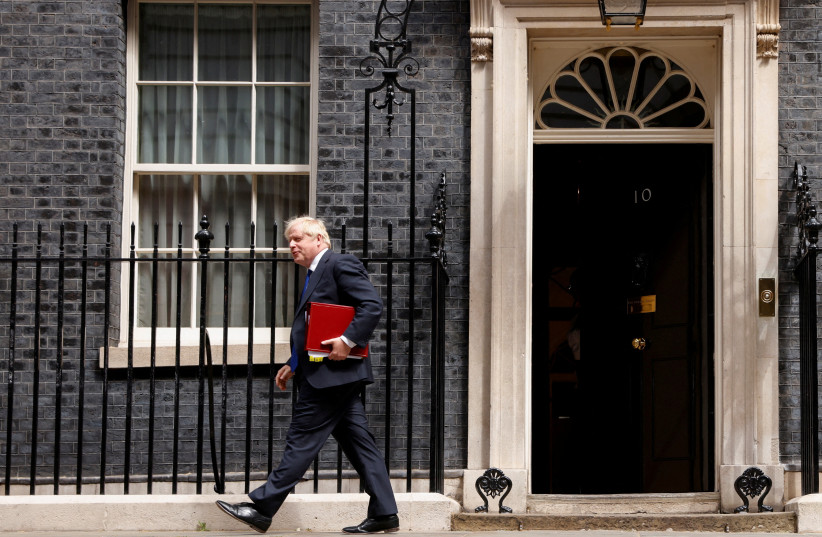The resignation of British Prime Minister Boris Johnson on Thursday comes at a time of flourishing relations between the United Kingdom and Israel.
For more stories from The Media Line go to themedialine.org
While still unclear who will replace him as prime minister and as leader of Britain’s Conservative Party, cooperation between the two countries will likely continue on the same path, unhindered.
In recent years, even before Johnson assumed the office in 2019, there were several highlights in the bilateral relations. Johnson formerly served as the country’s foreign secretary and was dominant in setting
the tone between Israel and the UK.

Johnson's Israel and Jewish community support
"He proved himself a great friend of Israel."
Richard Pater
Johnson is a vocal supporter of Israel. He has shown Israel support many times. As foreign secretary, he criticized the United Nations Human Rights Commission (UNHRC) for calling its focus on the Israel-Palestinian conflict “disproportionate and damaging.”
“He proved himself a great friend of Israel and of the Jewish community in the UK,” said Richard Pater, director of BICOM – Britain Israel Communications and Research Centre.
The next general election in the UK is scheduled for January 2025. Unless a snap election is called it is expected that the Conservative Party will remain in power.
“Whether it’s in trade, education, national security – the relationship is strong and it is moving in the right direction,” said Regev. “There is reason for confidence that whoever the Conservative leader will be, they will continue to be a friend of Israel,” he added.
According to data from the Israel Export Institute, the UK is Israel’s largest export destination in Europe and its second largest in the world. Britain is also one of the top countries Israel imports goods from.
The countries also share extensive tourism ties. These and other mutual interests guarantee the continuation of warm relations, experts say.
“There is a realization in Britain that Israel’s prowess in technology is beneficial,” Regev
said. “There is a desire to further strengthen economic ties and there is also a strong
national security relationship.”
Cooperation between the militaries of Britain and Israel is extensive. The ties between the countries’ different intelligence agencies are believed to be the same. The Israeli and British air forces frequently train together over the Mediterranean Sea. In late 2020, the two countries signed a military agreement increasing cooperation
between the two countries’ armies. The agreement was among many signed between the countries throughout the years, and not only in the military sphere. “This trend will continue and the strong support for bilateral relations will endure,” said Pater. “It’s a multi-faceted relationship built on shared values and interests that cover a
whole range of different fields. While the prime minister may set the tone, what has been proven over the last decade is that the relationship is growing from strength to strength.”
Throughout the years, there were incidents which soured relations. When Jeremy Corbyn was the leader of the Labour Party, for example, his harsh criticism of Israel could not be ignored.
“He did not believe in the Israeli-UK partnership,” said Regev. “He was hostile toward Israel. Johnson ended the threat when he came to power.”
For Britain’s Jewish community, which numbers over 260,000, Corbyn was perceived as a major threat. Many members of the Jewish community, who had previously voted for the Labour Party, abandoned it.
When he stepped down as leader of the opposition and leader of the Labour Party, many in Israel who saw the Corbyn leadership as antisemitic breathed a sigh of relief. The current leader of the Labour Party, Keir Starmer, is perceived as much friendlier to the Jewish state.
“The new Labour leadership has yet to be tested,” said Pater. “But it is in a more productive and conducive place for dialogue and engagement.”
Israel also currently is undergoing a period of political instability, with elections – the fifth in less than four years – slated for November 2022. Regardless of who will head either government, relations between the Israel and the UK appear to be immune to political fluctuations.
